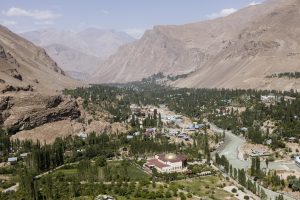The trial of a Pamiri mixed martial arts fighter in Tajikistan took an unexpected turn last week after a linguistic expert concluded that the statement that landed the man, Chorshanbe Chorshanbiev, in jail did not actually contain a call to violence. According to RFE/RL’s Tajik Service, the court ordered a new linguistic examination of the offending social media post.
Chorshanbe Chorshanbiev, a 26-year-old MMA fighter from Gorno-Badakhshan Autonomous Region, was deported from Russia in late December 2021. Officially, he was detained and deported over a speeding incident, but this would not be the first Tajik citizen deported from Russia at the request of Tajik authorities. Europe-based Tajik journalist Anora Sarkorova wrote on Facebook that the deportation was really an extradition.
Upon arrival in Tajikistan Chorshanbiev was detained, with the authorities alleging that statements he’d posted to social media amounted to violations of articles 189 and 307 of the Tajik Criminal Code, which cover actions “arousing national, racial, local or religious hostility,” and “public calls for the forcible capture of state power.” If convicted, Chorshanbiev could face up to 15 years in prison.
As Kamila Ibragimova chronicled in January for Eurasianet, Chorshanbiev’s troubles are rooted in a series of comments made over the past two years that some in Tajikistan have seen as offensive. To others, his statements are just trash talk and free speech.
In January 2020, in the context of trading barbs with a Russian opponent who referred to Chorshanbiev as a “Tajik fighter,” Chorshanbiev hit back, saying, “What do you mean Tajik? I’m not Tajik. You want to see a Tajik, look in the mirror… I am a Pamiri, written in big letters. Remember that forever.”
Six months later, Chorshanbiev apologized, saying that his intention was to tell the world that the Pamirs and the Pamiri people existed. But as for Tajikistan, he said, “What division can there be between us when we live on one land?”
Gorno-Badakhshan Autonomous Region (GBAO) is populated by the Pamiri people, an ethnic and religious Ismaili Shia minority in Sunni-majority Tajikistan. The region was attached to the Tajik Soviet Socialist Republic in the late 1920s and remains a part of the modern Tajik state. During the new country’s civil war, from 1992-1997, the region was a center of opposition, with many ethnic Pamiris siding with the democrats and Islamists against the central government. That tension remains nearly 30 years later, bubbling up most recently in November 2021 when the Tajik government responded to protests in Khorog by shutting off the region’s internet.
The protests were a response to the killing of a local man, Gulbiddin Ziyobekov, by the security services. As Agnieszka Pikulicka-Wilczewska explained in more detail for The Diplomat in February 2022:
The victim, Gulbiddin Ziyobekov, was not a stranger to conflict with the authorities. In February 2020, he assaulted a deputy governor who allegedly sexually harassed a young woman after she had approached him seeking help. While a criminal investigation into the incident was opened, it was soon dropped following intervention of the then GBAO governor, Yodgor Faizov.
… In 2012, 2014, and 2018, Pamiris rose up against the government and those who died in the clashes are remembered locally as war heroes.
Last November, time came for another chapter in the conflict. Faizov, the governor, lost his post and the investigation against Ziyobekov was resumed. Soon after, Ziyobekov’s body was found with several gunshot wounds. According to the authorities, the security services shot him in self-defense. But nobody in Khorog believed this version of events. When the news about the killing reached the local population, thousands took to the streets in central Khorog to demand justice.
It was amid this flare-up in tensions that Chorshanbiev took to social media again and decried the situation as unfair. He said people should react to injustice: “I urge you to stand up against injustice and against the unjust death of innocent people.”
That seems to be the comment that landed him in trouble with Dushanbe — which often interprets any calls for change at the government level as advocating the overthrow of the state. The case took an odd turn last week when the court ordered a new linguistic examination of his statements after a Russian expert, Yelizaveta Koltunova of the Institute of Linguistics and Journalism in Nizhny Novgorod, testified that his statement did not contain any “psychosocial or linguistic elements of calls for violence, including disruption of the foundations of the society and state.”































